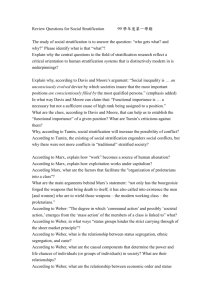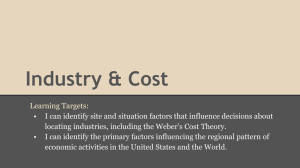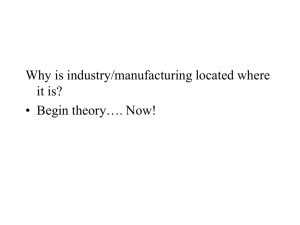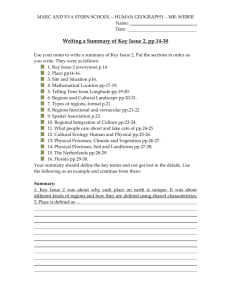Class
advertisement
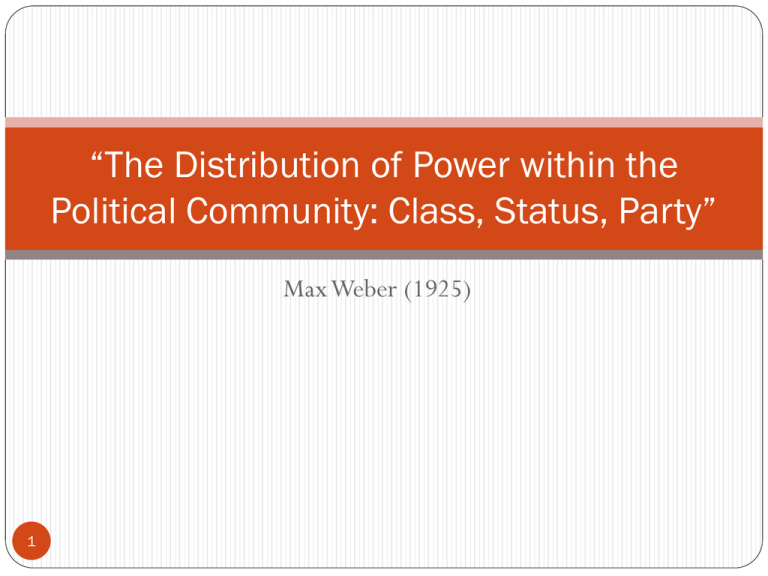
“The Distribution of Power within the Political Community: Class, Status, Party” Max Weber (1925) 1 From the early-capitalist Protestant Ethic to late-capitalist Austerity Austerity – web definitions the trait of great self-denial (especially refraining from worldly pleasures) wordnetweb.princeton.edu/perl/webwn severe simplicity saving; frugality (austere) ascetic: practicing great self-denial; "Be systematically ascetic...do...something for no other reason than that you would rather not do it"-William James; "a desert nomad's austere life wordnetweb.princeton.edu/perl/webwn In economics, austerity is when a government reduces its spending and/or increases user fees and taxes to pay back creditors. Austerity is usually required when a government's fiscal deficit spending is believed to be unsustainable. en.wikipedia.org/wiki/Austerity 2 Disenchantment of the world While rationalization “may breed greater efficiency in obtaining designated ends, it also leads to disenchantment, where “there are no mysterious incalculable forces that come into play, but rather that one can, in principle, master all things by calculation.” (159) 3 Weber’s four types of social action Nonrational Affective action Traditional action ORDER Value-rational action Collective Individual Instrumental-rational action 4 A C T I O N Rational Verstehen: interpretive understanding Weber defined sociology as a “science which attempts the interpretive understanding of social action in order thereby to arrive at a causal explanation of its course and effect” Unlike Marx and Durkheim, who sought to uncover universal laws applicable to all societies, Weber attends to the production of meaningful behavior as it is grounded within a specific historical context seeks to understand the culturally-patterned states of mind or motivations that guide individuals’ behavior 5 Ideal type The ideal type is analytical construct, a means to do social research A tool that aids description and explanation Ideal type is derived from empirical observation, but it’s an abstraction The combination of elements which although found in reality, are rarely found in this specific form It's not "ideal" in the normative sense, but in the sense that this combination of elements is not found in reality in this pure form e.g., an ideal type of "criminal,” “monopoly,” or “plutocracy” 6 Ideal types of social action traditional: actions controlled by tradition or deeply rooted habits, "the way it's always been done" 2) affective: actions determined by the actor's specific affections and emotional state 3) value-rational: actions that are determined by a conscious belief in the inherent – ethical, esthetic, religious, etc. – value of a type of behavior, regardless of its effects 4) instrumental-rational: actions that are carried out to achieve a certain goal; the actor calculates which actions will lead in the best and most effective manner to the goal that's been set 1) 7 Class as self-identification The practice of people locating themselves within a class structure – rather than being “assigned” to classes based on particular relations or attributes, such as wealth or occupation – is often called “subjective class identification” Survey methods typically rely on this conceptualization of class The General Social Survey (GSS), a representative, unrestricted sample of all Americans over age 18 measures the subjective class identification of Americans Q: “If you were asked to use one of four names for your social class, would you say you belong in: the lower class, the working class, the middle class, or the upper class?” 8 42% of Americans say they’re middle class, while almost 47% identify as working class. By contrast, a relatively small slice (8%) of Americans call themselves lower class, and very few (less than 3%) identify as upper class. 9 Class, status and party Classes, status groups, and parties are phenomena of the distribution of power within a community power: the chance of a man or of a number of men to realize their own will in a social action even against the resistance of others 10 A. Economically determined power and the status order The structure of every legal order directly influences the distribution of power, economic or otherwise, within its respective community Economically conditioned power is not identical with power as such Economic power may be the result of power on other grounds People do not strive for power only to enrich economically Power may be valued for its own sake Striving for power often is conditioned by social honor, but not all power entails social honor, e.g., the “typical American Boss,” the “typical big speculator” 11 B. Determination of class situation by market situation Class is economically determined but it refers not simply to relations to the means of production (owners of capital vs owners of labor power a la Marx) Class refers more broadly to market situation Weber subdivides property owners based on the kind of property that is usable for returns: rentiers and entrepreneurs Weber subdivides those who lack property on the basis of the kinds of services offered and they way in which they make use of these services: unskilled workers, skilled laborers, professionals, etc. Class refers to "similarity of life chances" as determined by "economic interests in the possession of goods and opportunities for income" under the conditions of the commodity or labor markets 12 C. Social action flowing from class interest The emergence of an association or even of mere social action from a common class situation is by no means a universal phenomenon Often merely amorphous social action emerges (e.g., “grumbling”) For “class action,” the contrast of life chances must be distinctly recognizable and seen as resulting from either 1) the given distribution of property (seen in urban centers of Antiquity and the Middle Ages) or 2) the structure of the concrete economic order (seen in the class situation of the modern proletariat) 13 D. Types of class struggle A class does not in itself constitute a group Social action that brings forth class situations is not basically action among members of the identical class; it is an action among members of different classes Weber described the changing nature of class struggle through the late 19th century as shifting from the issue of credit, to struggles in the commodity market (exchange) to wage disputes on the labor market (production), and claimed “Today the central issue is the determination of the price of labor.” That may have been the case in Weber’s day, but circa 2012 the situation is markedly different 14 Market situation: the rise of creditors Rentier: an archaic word for asset owners or creditors, i.e., individuals who gain income from assets (interest, rent, dividends, or capital gains) rather than labor “The creditor-debtor relation becomes the basis of ‘class situations’ first in the cities” where credit markets are located and concentrated in the hands of a “plutocracy.” “Therewith, ‘class struggles’ begin.” (194) Many claim such a situation exists today: “Creditor-friendly policies are crippling the economy. This is a negative-sum game, in which the attempt to protect the rentiers from any losses is inflicting much larger losses on everyone else. And the only way to get a real recovery is to stop playing that game." (Paul Krugman, NYT, 6/10/2011) 15 The latest Quarterly Release on Household Debt and Credit from the Federal Reserve shows 2 notable trends: 1) the amount of consumer debt is declining, but delinquency rates are stabilizing above what they were pre-crisis; 2) the number of people subject to 3rd party collections has doubled since 2000. Ten years ago, 1 in 14 Americans were pursued by debt collectors. Today it’s 1 in 7. 16 E. Status honor Status situation is determined by social estimation of honor, which may be connected with any quality shared by a plurality and, of course, it can be connected to a class situation In contrast to classes status groups are usually “groups” but are often amorphous Class distinctions are linked in varied ways with status distinctions Status is stratification according to principles of consumption of goods and services, i.e., "lifestyle" 17 F. Ethnic segregation and caste Status groups can evolve into closed castes Status distinctions are then guaranteed not merely by conventions and laws, but also by religious sanctions this generally happens only when underlying differences are said to be "ethnic" Ethnic segregation grown into a caste transforms the horizontal and unconnected coexistences of ethnically segregated groups into a vertical social system of domination and subordination Ethnic communities are based on a belief of commonality rather than any objective “racial differences” The relationship between ethnicity/race and social status is variable 18 G. Status privileges Stratification by status goes hand in hand with a monopolization of ideal and material goods or opportunities Material monopolies provide the most effective motives for the exclusiveness of a status Physical labor generally disqualifies one from membership in the most privileged status groups Weber: “This disqualification is now setting in in America against the old tradition of esteem for labor.” Often economic pursuits, especially entrepreneurial activity, is seen as a debasement of status 19 H. Economic conditions and effects of stratification "With some oversimplification, one might say that classes are stratified according to their relations to the production and acquisition of goods; whereas status groups are stratified according to the principles of their consumption of goods as represented by special styles of life." (200) The general effect of the status order is "the hindrance of the free development of the market" "Therefore, everywhere some status groups and usually the most influential, consider almost any kind of overt participation in economic acquisition as absolutely stigmatizing" e.g., the parvenu or nouveau riche 20 I. Parties Whereas classes are within economic order, status groups within the social order, "parties reside in the sphere of power" Compared with class and status groups, party-oriented social action always involves association directed toward a goal, which is striven for in a planned manner The goal may be a cause or may be personal Parties are only possible in groups with an associated character, i.e., some form of rational order and a staff of persons available to enforce it Parties need not be based on purely class nor status Parties differ according to whether or not the community is stratified by status or by class, above all, according to the structure of authority 21
